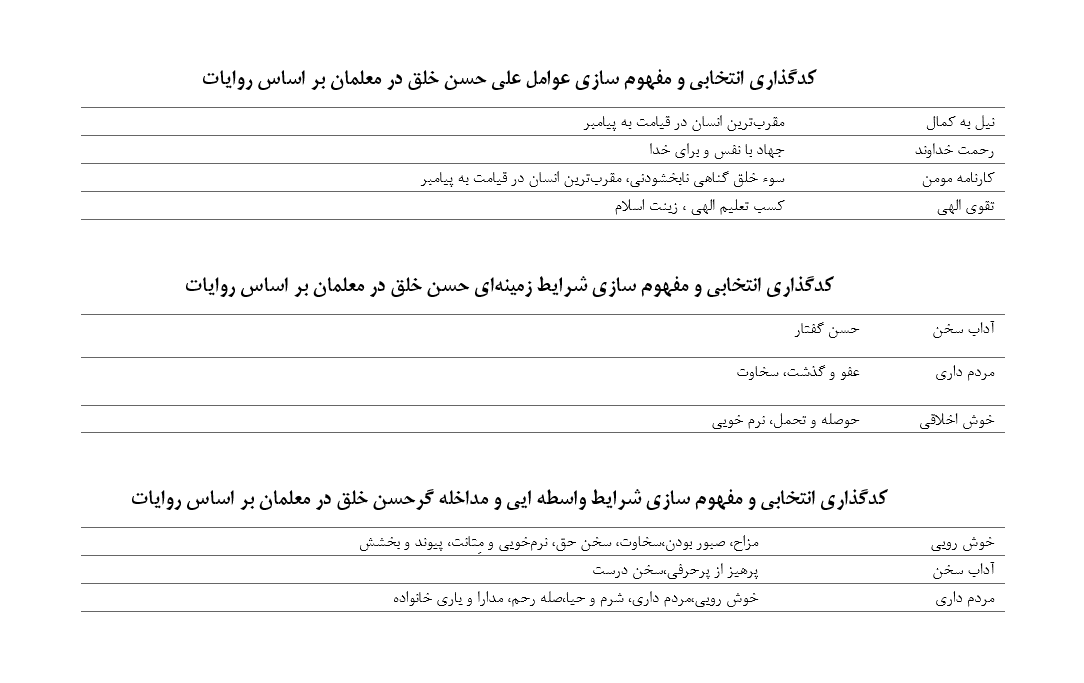Explaining the Teacher’s Character Based on the Moral Value of Good Temperament: Educational Implications
Keywords:
desirable good temperament, Qur’anic model, educational implications, teacher’s characterAbstract
This study aimed to explain the teacher’s character based on the moral value of ḥusn al-khuluq (good temperament) and to infer its educational implications. To achieve this objective, the methods of conceptual analysis, grounded theory, and inferential analysis were used. The findings, based on narrations, showed that the causal factors influencing the realization of desirable good temperament include perfectionism, divine mercy, a record of faith, and God-pleasing piety. Furthermore, the contextual conditions facilitating good temperament in teachers consist of propriety in speech, sociability, and good manners. On the other hand, intervening and mediating factors in this regard were identified as cheerfulness, observing verbal courtesy, and constructive interaction with others. Teachers’ strategies for cultivating desirable good temperament were categorized into various dimensions such as gratitude, continuous effort, generosity, truth-centered speech, supporting the family, observing verbal propriety, eloquence, balanced humor, sociability, patience and tolerance, anger control, forgiveness, kindness, humility, protecting others’ dignity, confidentiality, gentleness, courteous behavior, affection toward fellow humans, and maintaining family ties. The positive outcomes of good temperament in teachers included achieving complete faith, enhancing spiritual records, gaining social credibility, increased livelihood, prosperity, and longevity. Subsequently, using inferential analysis, a conceptual model of education for desirable good temperament was designed and explained. The educational principles of this model comprised divine mercy, divine affection, divine justice, divine knowledge and comprehensive understanding, faith and righteous deeds, pursuit of perfection, human dignity, and belief in the afterlife. Moreover, effective educational methods for fostering good temperament in human beings were extracted and elaborated. By providing a systematic framework, this study has taken a step toward outlining an ideal model of teachers’ professional ethics based on Islamic teachings.
Downloads
References
Javadi Amoli A. Shari'at dar Ayineh-ye Ma'refat (Sharia in the Mirror of Gnosis): Raja Cultural Publishing Center; 1993. 93 p.
Ali Akbar K, Shahroudi MR, Abbaei Koopaee M, Koochanani G. A Study of Good Morals and Their Effects from the Perspective of the Quran and Hadith with an Emphasis on Lifestyle Reform. Safineh. 2020;17(69):10-26.
Feyz Kashani M. Al-Mahajjat al-Bayda fi Tahdhib al-Ihya'. Qom: Jame'eh-ye Modarresin-e Qom; 2004.
Makarim Shirazi N. Amthal al-Quran. Qom: Imam Ali (a.s.) Seminary Publications; 2015.
Naraqi MMM. Elm-e Akhlaq-e Eslami (Islamic Ethics, Translation of Jame' al-Sa'adat). Tehran: Hekmat Publications; 1998.
Mazandarani MS. Sharh al-Kafi. Tehran: Al-Maktabat al-Islamiya; 2003. 287 p.
Ibn Manzur MiM. Lisan al-Arab. Beirut: Dar Sadir; 1993. 85 p.
A'Rafi A. Fiqh-e Tarbiyati (Educational Jurisprudence). Qom: Hawzah and University Research Institute; 2008.
Beheshti M. Akhlaq va Tarbiyat-e Akhlaghi (Ethics and Moral Education). Ma'aref. 2002(10).
Bagheri K. Negah-e Dobareh be Tarbiyat-e Eslami (A Second Look at Islamic Education). Tehran: Madreseh; 2008.
Naraqi M. Tarjomeh-ye Matn-e Kamel-e Jame' al-Sa'adat (Translation of the Complete Text of Jame' al-Sa'adat): Ghaem Al-e Ali; 2015. 343 p.
Shokouhi G. Ta'lim va Tarbiyat va Marahil-e An (Education and its Stages). Mashhad: Astan Quds Razavi; 1988.
Tabataba'i SMH. Tafsir al-Mizan. Qom: Jame'eh-ye Hawzeh-ye Elmiyeh-ye Qom; 1995.
Tabarsi Farahani FiH. Makarim al-Akhlaq. Tehran2003.
Hurr Amili MiH. Wasa'il al-Shi'a. Qom: Al al-Bayt Institute; 2003.
Kulayni MiYqiI. Al-Kafi. Tehran: Dar al-Kutub al-Islamiya; 1986. 244 p.
Majlisi MB. Bihar al-Anwar. Tehran: Dar al-Kutub al-Islamiya Publications; 2025.
Raghib Isfahani MiH. Al-Mufradat fi Alfaz al-Quran al-Karim. Damascus1983.
Hosseini SJfS. Asalib al-Ma'ani fi al-Quran. Qom: Bustan-e Ketab; 2006.

Downloads
Published
Submitted
Revised
Accepted
Issue
Section
License
Copyright (c) 2025 Masoumeh Kasaei (Author); Seyed Jalal Hashemi (Corresponding author); Nasrin Ghanbari (Author)

This work is licensed under a Creative Commons Attribution-NonCommercial 4.0 International License.










